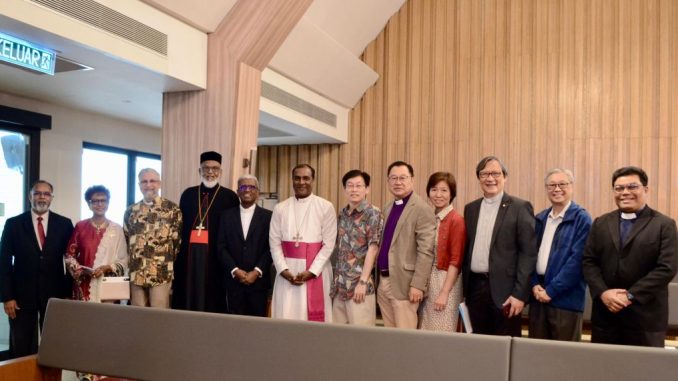
Unity is central to the Christian faith because it reflects God’s nature, strengthens the Church, and advances His mission in the world. The Bible emphasizes that God exists in perfect unity within the Trinity – Father, Son, and Holy Spirit – and calls believers to mirror this unity in their relationships. Jesus prayed for His followers to be united, saying, “May they be brought to complete unity to let the world know that You sent Me” (John 17:23). This unity serves as a testimony to the world of God’s love and truth.
Moreover, unity strengthens the Church by fostering mutual love, support, and encouragement among believers. Paul teaches that the Church is like a body, where each member has a role and works together for the common good (1 Corinthians 12:12-27). We are different parts of the Body of Christ. Divisions weaken the Body of Christ, while unity empowers it to fulfill its mission of spreading the Gospel and serving others. Unity does not require uniformity but calls for love, humility, and a shared commitment to Christ as the foundation of faith.
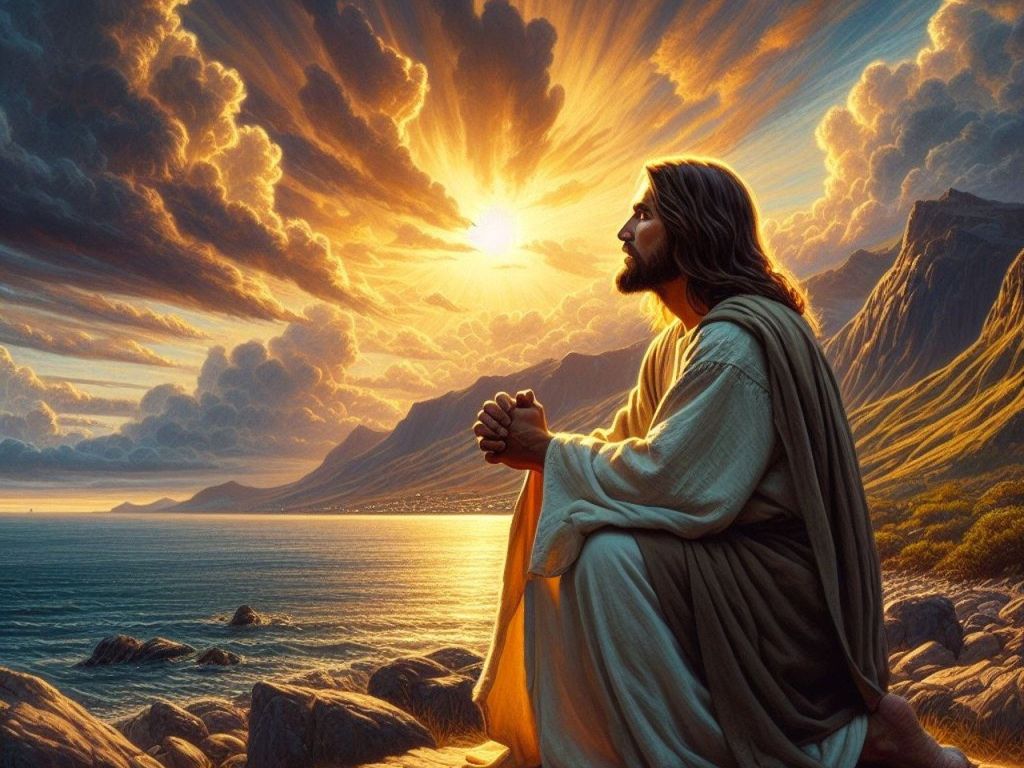
In Malaysia, an organisation that holds an important role in the ecumenical movement is the Council of Churches of Malaysia (CCM). A vital member of the Christian Federation of Malaysia (CFM), which also includes the Catholic Church and NECF, one fundamental aspect of CCM’s identity as an organisation is to foster Christian Unity and Collaboration in Malaysia. Besides the work among Christians, the CCM also has an important public role on the moral, social, and national level, which involves much social and public engagement.
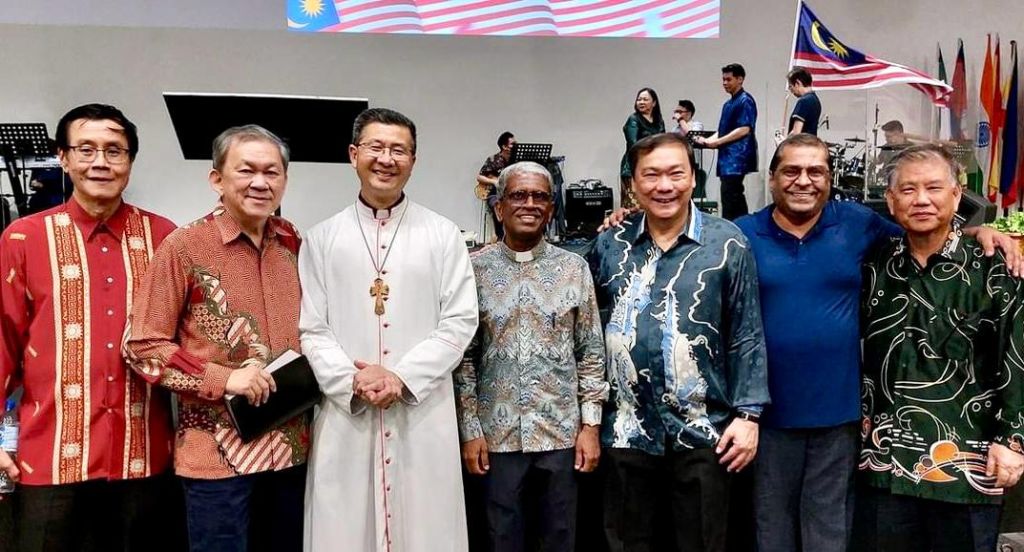
Recently, we chatted with Elder Steven Fung about their legacy and the celebration and commemoration of the first ecumenical council in Nicaea in next year’s Week of Prayer for Christian Unity, as well as the significance of the Nicene Council to the unity of the Church.
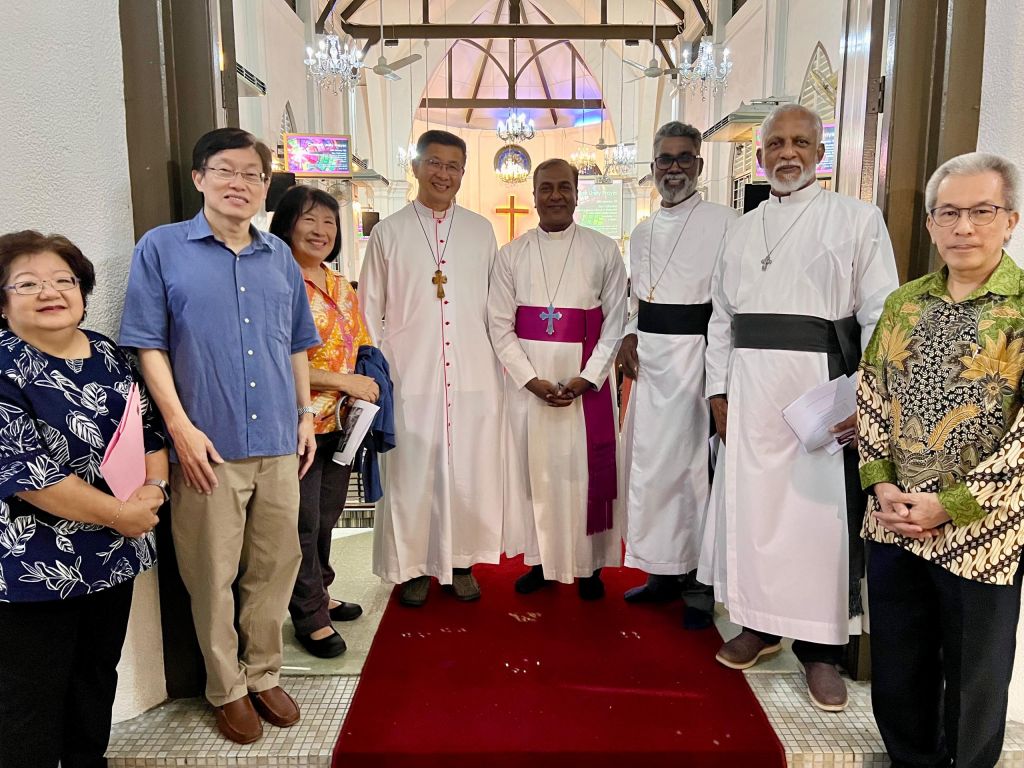
The Conversation:
An important event in CCM/CFM’s ministry is the annual Week of Prayer for Christian Unity. What is the Week of Prayer for Christian Unity and what is its purpose and significance as an annual event for churches worldwide?
The Week of Prayer for Christian Unity is an annual event observed by many Christian denominations worldwide, typically held from January 18 to January 25 in the northern hemisphere (and around Pentecost in the southern hemisphere). Its purpose and significance can be understood in several key ways:
- Fostering Christian Unity
- The primary aim is to encourage prayer and reflection on the unity of all Christians, acknowledging the differences among denominations and working toward the vision of unity as expressed by Jesus in John 17:21: “That they may all be one.. so that the world may believe”.
- It provides an opportunity for Christians from various traditions to come together, overcoming theological, cultural, and historical barriers. We are just different parts of the Body of Christ.
- Strengthening Ecumenical Relations
- The week is a vital aspect of the ecumenical movement, which seeks to promote understanding, dialogue, and collaboration among Christian denominations such as Roman Catholic, Anglican, Coptic, Evangelical, Mar Thoma, Methodist, Orthodox, Lutheran, Presbyterian, Assembly of God, Baptist, Brethren, Evangelical, Full Gospel Assembly, Sidang Injil Borneo, and other independent or congregational churches in Malaysia.
- Through shared worship services, Bible studies, and community activities, churches build relationships and work together for common causes in Christ.
- Witnessing to the World
- The event demonstrates the Christian commitment to reconciliation and cooperation, serving as a witness to the world of the transformative power of Christ’s message.
- By coming together in unity as one in Christ, churches provide a visible sign of hope, promoting peace and understanding in a divided world.
- Encouraging Mutual Learning
- The week allows Christians to learn about one another’s traditions and practices, deepening their understanding of the diverse ways in which our faith is expressed.
- It helps break down stereotypes and misconceptions, fostering respect and appreciation for different liturgical practices, theology, and customs.
- Practical Collaboration
- Beyond prayer, the event often inspires joint initiatives in social justice, charity, and community service, reflecting a shared commitment to addressing global challenges such as poverty, inequality, and conflict.
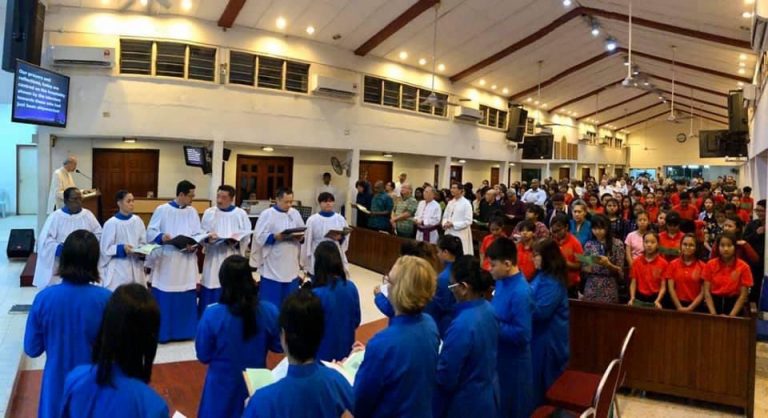
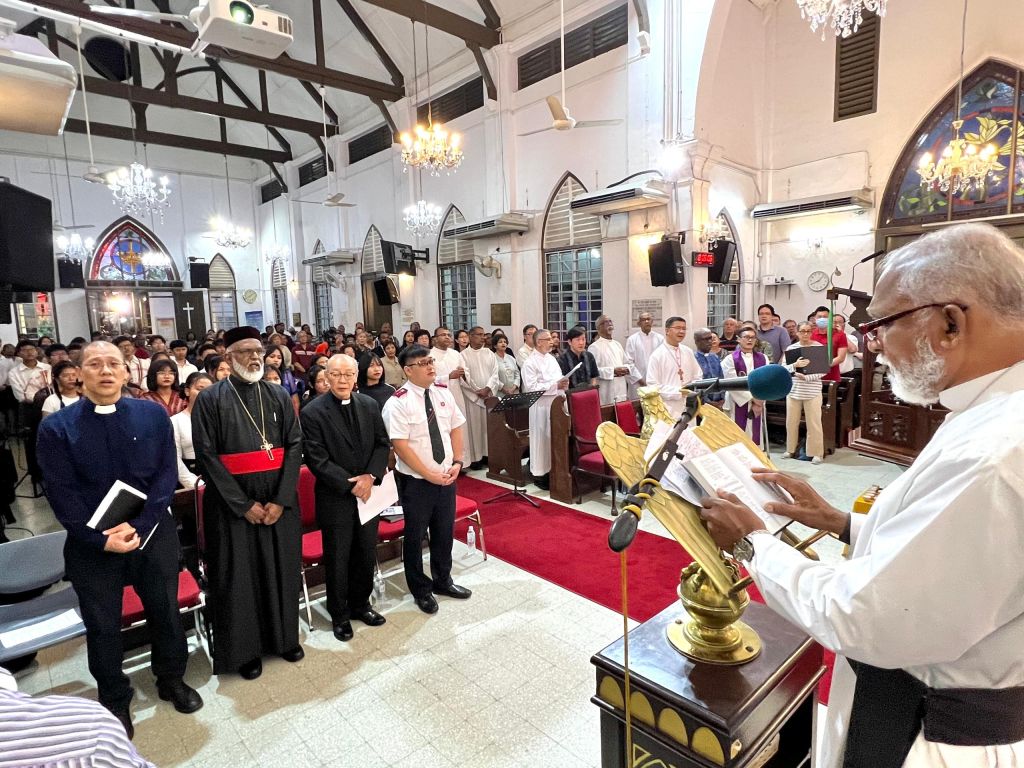
How are the events organised each year and what are the resources available for churches who are eager to participate? How will the resources shape the Week of Prayer in 2025?
Each year, a specific theme and scriptural focus guide the week, often developed by a particular country or group in collaboration with the World Council of Churches (WCC) and the Pontifical Council for Promoting Christian Unity. Resources include liturgical materials, Bible readings, and reflections to support worship and activities. In 2025, we confront a central question:
Jesus asked, “Do you believe this?”
The guiding biblical text for the Week of Prayer for Christian Unity 2025 is taken from John 11:17-27, with the theme for the week, “Do you believe this?” (v. 26), taking its cue from the dialogue between Jesus and Martha when Jesus visited the home of Martha and Mary in Bethany following the death of their brother Lazarus.
Jesus confronting our unbelief
When Jesus arrived, he found that Lazarus had already been in the tomb for four days. Now Bethany was near Jerusalem, some two miles away, and many of the Jews had come to Martha and Mary to console them about their brother. When Martha heard that Jesus was coming, she went and met him, while Mary stayed at home. Martha said to Jesus, “Lord, if you had been here, my brother would not have died. But even now I know that God will give you whatever you ask of him”. Jesus said to her, “Your brother will rise again”. Martha said to him, “I know that he will rise again in the resurrection on the last day”. Jesus said to her, “I am the resurrection and the life. Those who believe in me, even though they die, will live, and everyone who lives and believes in me will never die. Do you believe this?” She said to him, “Yes, Lord, I believe that you are the Messiah, the Son of God, the one coming into the world”. Today, that question still remains relevant to every believer; Do we believe it? Jesus is confronting our unbelief.
In essence, the Week of Prayer for Christian Unity is a reminder of Christians’ shared belief, faith and mission, calling them, as different parts of the Body of Christ, to work together in love and service while striving toward greater unity in Christ.
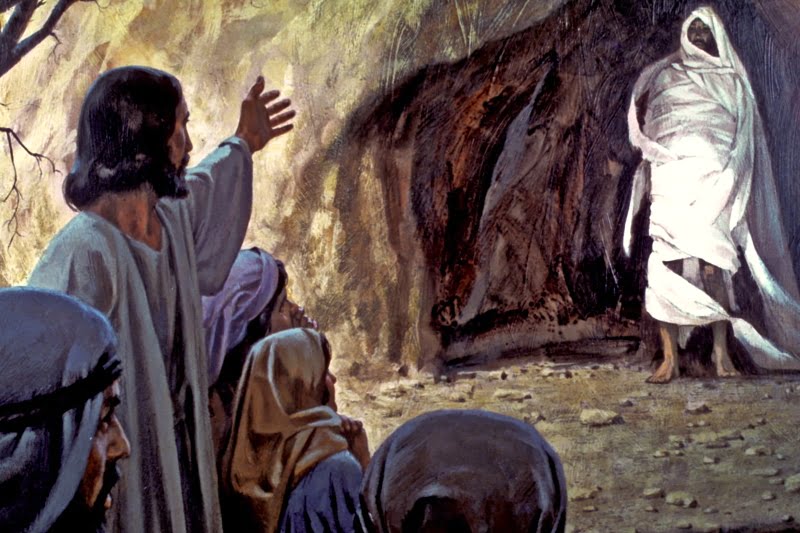
2025’s Week of Prayer is especially significant because it will be remembering the first ecumenical council in Nicaea, best known for the formulation of the Nicene Creed. Why is the council and the Nicene Creed important for Christian unity?
All One in Christ Jesus
The First Council of Nicaea (325 CE) holds profound significance for Christian unity and remains relevant to ecumenical efforts today, particularly so as it predates the major schisms within Christianity, such as the Great Schism (1054) and the Protestant Reformation (16th century) – offering a common point of reference for all Christians at a time when the Church was largely united as a single universal (or catholic) Church in addressing common challenges.
Convoked by the Emperor Constantine, the Council of Nicaea was attended, according to tradition, by 318 Fathers, mostly from the East. The Church, having just emerged from hiding and persecution, was beginning to experience how difficult it was to share the same faith in the different cultural and political contexts of the time. Agreement on the text of the Creed was a matter of defining the essential common foundations or the core beliefs on which to build local communities that recognised each other as sister churches while respecting the diversities or differences of the other.
Disagreements had arisen among Christians in the previous decades, which sometimes degenerated into serious conflicts. These disputes were on matters as diverse as: the nature of Christ in relation to the Father; the question of a single date to celebrate Easter and its relationship with the Jewish Passover; opposition to theological opinions considered heretical; and how to re-integrate believers who had abandoned the faith during the persecutions in earlier years.
“We believe..”
The approved text of the Creed used the first-person plural, “We believe…”. This form emphasised the expression of a common belonging. The Creed was divided into three parts dedicated to the three persons of the Trinity, followed by a conclusion condemning affirmations that were considered heretical. The text of this Creed was revised and expanded at the Council of Constantinople in 381 AD, where the condemnations were removed. This is the form of the profession of faith that Christian churches today recognise as the Nicene-Constantinopolitan Creed, often referred to simply as the Nicene Creed.
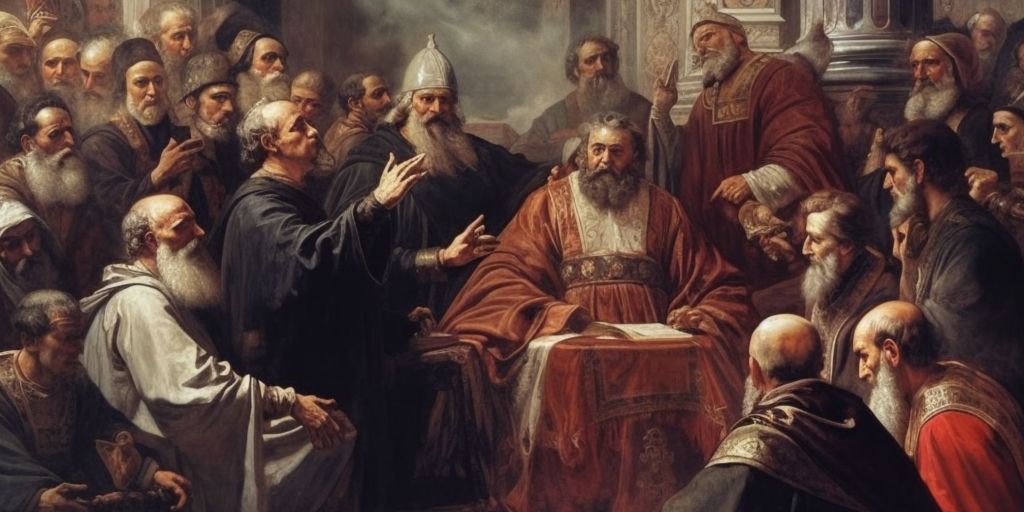
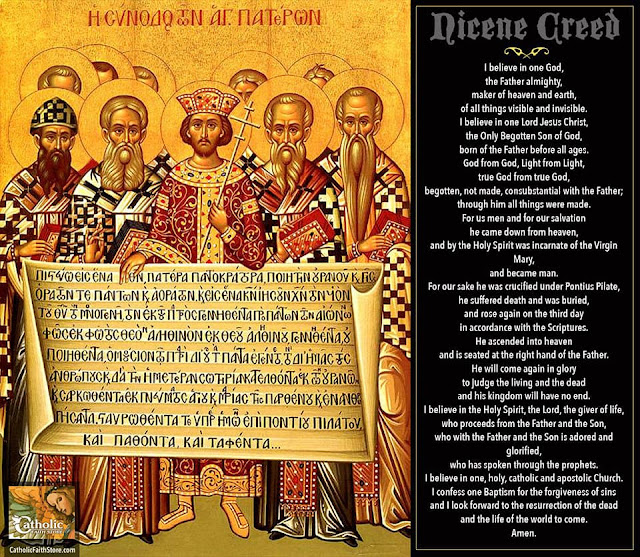
How does the legacy of the Council of Nicaea and the Nicene Creed resonate with believers even today?
Its legacy shapes theological, doctrinal, and ecclesial frameworks that continue to guide Christian dialogues and efforts toward reconciliation. Here is how its importance resonates in the context of the 2025 Week of Prayer for Christian Unity:
- Establishing Core Christian Beliefs
- The Council of Nicaea was pivotal in defining the Nicene Creed, which affirms foundational Christian beliefs, particularly about the nature of Christ (His divinity) and the Trinity.
- The Nicene Creed is still a shared profession of faith for most Christian traditions, including Roman Catholic, Anglican, Coptic, Evangelical, Mar Thoma, Methodist, Orthodox, Lutheran, Presbyterian, Assembly of God, Baptist, Brethren, Evangelical, Full Gospel Assembly, Sidang Injil Borneo, and other independent or congregational churches. It serves as a starting point for Christian unity by highlighting common theological ground.
- Affirming a Universal or “Catholic” Church
- The Council marked one of the earliest efforts to unify the global Christian community by addressing doctrinal disputes (e.g., the Arian controversy over Christ’s divinity).
- It set a precedent for dialogue and collaboration across diverse regions and cultures within the Church – a principle that underlies modern ecumenical efforts.
- Highlighting the Importance of Addressing Division
- The Council arose from the urgent need to resolve divisions and differences within the Church, particularly regarding Christology. This commitment to resolving disputes resonates with ecumenical dialogues today, which often tackle issues of theological disagreement, governance, and worship.
- Commemorating Nicaea in 2025 reminds Christians of the value of addressing conflicts constructively to preserve unity in the Body of Christ.
- Providing a Historical Anchor for Dialogue
- The Council predates the major schisms within Christianity, such as the Great Schism (1054) and the Protestant Reformation (16th century). This shared historical moment offers a common point of reference for all Christians, symbolising a time when the Church was largely united as a single, universal (or catholic) Church, in addressing common challenges.
- Ecumenical dialogue frequently looks back to such early councils to rediscover commonalities and to reimagine what unity might look like today.
- Emphasising Christ-Centred Unity
- The Council of Nicaea’s focus on Christ’s divine and human natures reminds Christians that unity is rooted in a shared understanding of Christ as central to faith.
- Ecumenical efforts often centre on rediscovering this Christological foundation as the bedrock of reconciliation and cooperation among divided traditions.
- Encouraging a Universal Witness
- The Council’s decisions were intended to provide a universal witness to the truth of Christianity, transcending local disputes and offering a cohesive message to the world.
- Similarly, the Week of Prayer for Christian Unity seeks to show the world that Christians can rise above their diversities and differences to offer a unified testimony of Christ’s love and hope – “so that the world may believe”.
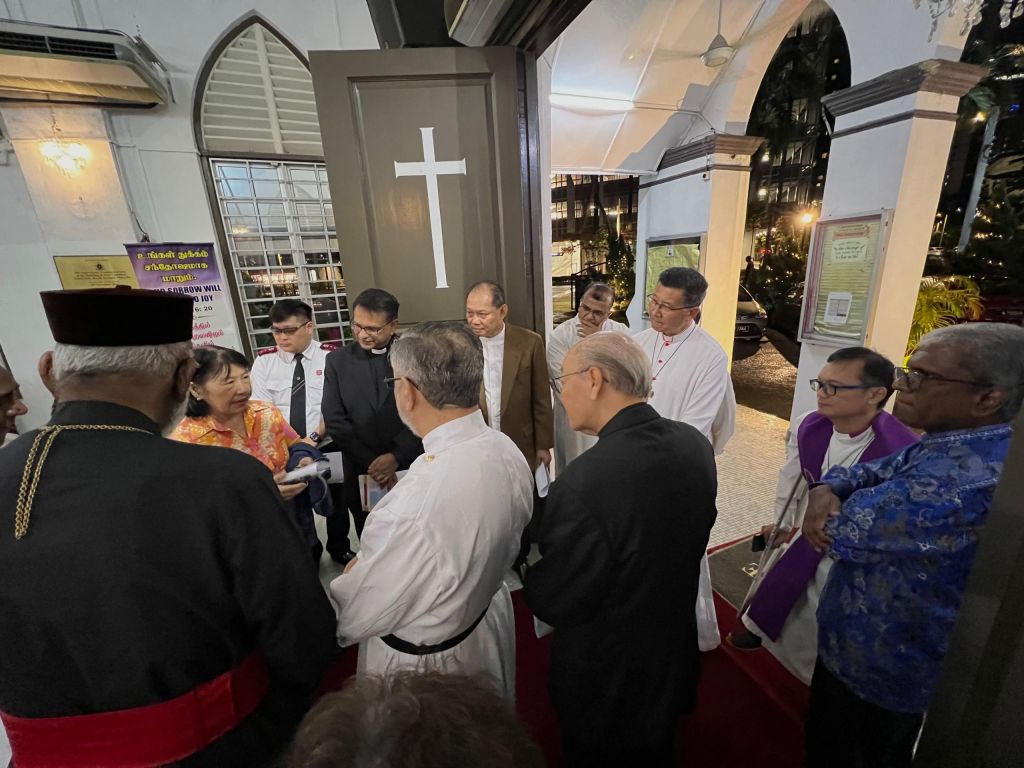
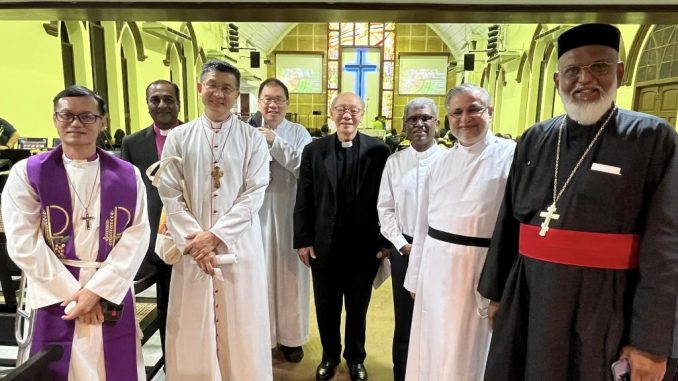
What Practical Implications can we derive from the Council of Nicaea and the Nicene Creed for 2025?
The Nicene Creed has been a foundation in the Christian Church for more than 15000 years. The 1,700th anniversary of the First Council of Nicaea in 2025 provides an opportunity for churches to:
- Reaffirm shared beliefs articulated in the Nicene Creed.
- Reflect on how historical efforts to maintain unity can inform contemporary challenges.
- Engage in joint prayer, study, and dialogue centred on the themes of unity and reconciliation.
- Promote understanding of early Church history as a shared heritage.
In summary, the Council of Nicaea exemplifies the possibilities of theological unity and cooperative decision-making, values that remain central to ecumenical efforts as it predates the major schisms within Christianity and offering a common point of reference for all Christians at a time when the Church was largely united as a single universal (or catholic) Church in addressing common challenges.
Bishop Reuel Norman O. Marigza, Christian Conference of Asia Moderator, in his Presidential Remarks at the inauguration of the Tenth Congress of Asian Theologians (CATS-X) and the commemoration of the 1700th Anniversary of the Council of Nicaea that took place on 24 October 2024, at the Zion Cathedral of the Evangelical Lutheran Church in Malaysia (ELCM) in Kuala Lumpur, Malaysia, reflected on the unity of the Church and the importance of viewing Christian unity not as an end in itself, but as a means to an end; it carries a missiological thrust and dimension to it – “so that the world may believe”.
Bishop Marigza stated, “Rooted in the historical significance of the Council of Nicaea in 325 AD, our theme serves as a guiding thread, weaving together the enduring facets of faith and the imperative of fostering unity within the multi-faceted context of Christianity.” Its commemoration during the 2025 Week of Prayer for Christian Unity invites Christians to reflect on their shared faith and history as they strive toward the unity envisioned by Christ.
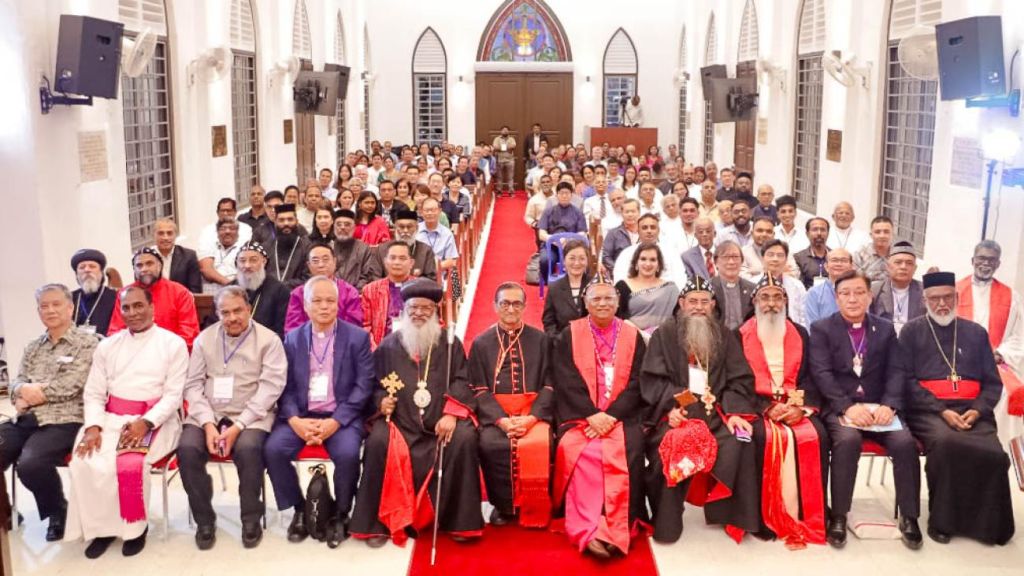
How does the Week of Prayer promote unity among Christians?
The Week of Prayer for Christian Unity serves as a powerful platform to promote unity among Christians worldwide, including in Malaysia. Its observance encourages dialogue, collaboration, and shared worship, or even Bible studies, across denominational lines, fostering deeper relationships among Christians of diverse traditions.
CCM is actually part of a larger umbrella organisation. In Malaysia, the Christian Federation of Malaysia (CFM) plays a significant role in supporting and coordinating ecumenical efforts for unity. It represents some 95% of the Christians in Malaysia. Here is how the Week of Prayer promotes unity and the specific contributions of the Catholic Church, the Council of Churches Malaysia (CCM), and the National Evangelical Christian Fellowship (NECF) within the CFM framework:
CFM’s Role:
- Facilitates the organisation of joint ecumenical prayer gatherings during the week, involving Roman Catholic, Anglican, Coptic, Evangelical, Mar Thoma, Methodist, Orthodox, Lutheran, Presbyterian, Assembly of God, Baptist, Brethren, Evangelical, Full Gospel Assembly, Sidang Injil Borneo, and other independent or congregational churches in Malaysia.
- Encourages member churches to reflect on the annual theme and collaborate in designing inclusive worship services.
- Breaking Down Barriers: Through collaboration during the week, churches learn about each other’s traditions, worship practices, and theological perspectives, fostering mutual respect and breaking down stereotypes.
- Provides a neutral platform where representatives from the Catholic Church, CCM, and NECF can engage in constructive dialogue.
- Acts as a mediator when theological or cultural differences arise, ensuring inclusivity in planning and participation.
- Coordinates efforts between the Catholic Church, CCM, and NECF to represent Christians collectively in public matters, such as advocating for religious freedom and addressing social justice issues.
- Joint prayer during the Week of Prayer becomes a visible sign of Christian unity to the Malaysian public.
- Encourages its members to engage in ecumenical projects that address shared concerns, such as poverty, education, and interfaith harmony.
- Promotes unity by emphasising common Christian values and responsibilities in addressing societal challenges.

What are the individual roles of the respective key members in the Christian Federation of Malaysia (CFM)?
The roles of the three key bodies in the Christian Federation of Malaysia are as follows:
Catholic Church:
- Contributes its rich liturgical tradition and theological insights, emphasising the importance of prayer and sacramental unity.
- Actively participates in joint worship services and dialogues, fostering collaboration with other traditions.
Council of Churches Malaysia (CCM):
Represents the mainline Protestant and Orthodox churches, including Anglican, Coptic, Evangelical, Mar Thoma, Methodist, Orthodox, Lutheran, Presbyterian, and others.
Brings a focus on ecumenical worship, social justice, and theological discussions during the Week of Prayer.
National Evangelical Christian Fellowship (NECF):
- Represents Evangelical, Pentecostal and Congregational (Assembly of God, Baptist, Brethren, Evangelical, Full Gospel Assembly, Sidang Injil Borneo, etc) and other independent or congregational churches in Malaysia.
- Highlights the importance of personal faith and evangelism while engaging in prayer and worship alongside other traditions.
In Conclusion:
The Week of Prayer for Christian Unity, supported by the Christian Federation of Malaysia, provides a unique opportunity for Christians in Malaysia to celebrate their shared faith while acknowledging and respecting their diversities as the different parts of the Body of Christ. The Catholic Church, CCM, and NECF, under the CFM umbrella, play complementary roles in advancing unity through prayer, dialogue, and joint action. Together, they present a unified Christian witness in a pluralistic society, exemplifying the vision of unity that the Week of Prayer seeks to inspire.
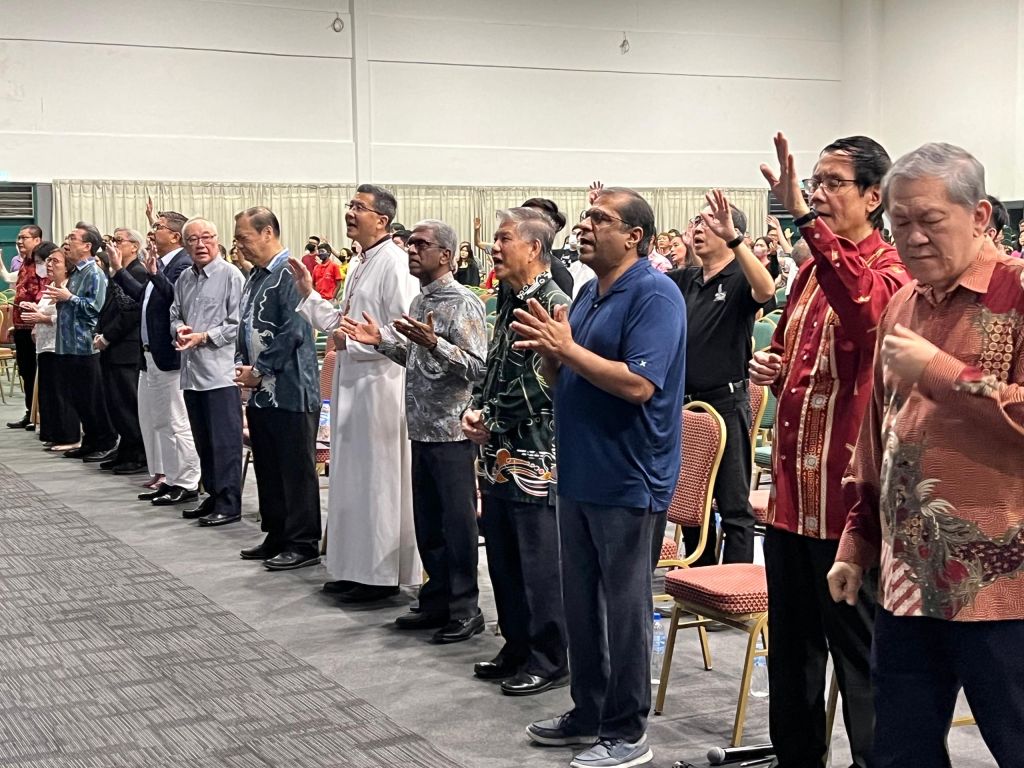
How has the Week of Prayer in Malaysia changed over time, and how does it continue to engage local churches in reflecting on themes of unity and common heritage?
The hosting of the annual Prayer Service rotates among different churches, with it gaining a particular momentum in 2016. It was then initiated by The Most Reverend Archbishop Julian Leow of the Cathedral of St. John The Evangelist in collaboration with some of the Kuala Lumpur churches; namely, St. Andrew’s Presbyterian Church Kuala Lumpur, Wesley Methodist Church Kuala Lumpur, and Holy Trinity Bukit Bintang. Churches in areas other than Kuala Lumpur have since also started to take turns hosting it.
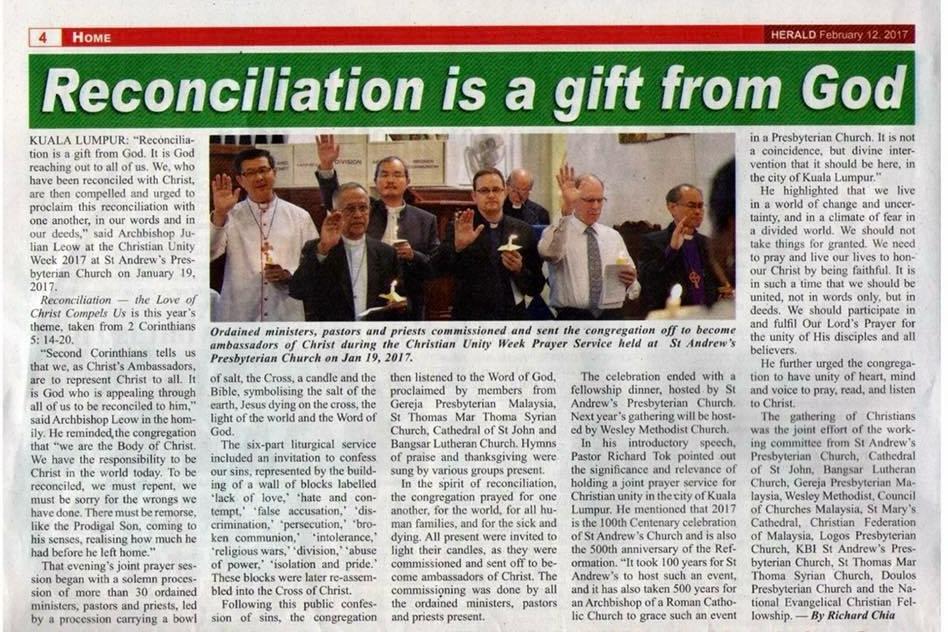
We then commemorated the 500th Anniversary of the Protestant Reformation (16th Century) in 2017 when St. Andrew’s Presbyterian Church, Kuala Lumpur hosted it. Remarkably, Archbishop Julian Leow delivered the sermon – the first time for a Roman Catholic Archbishop to do so in a Presbyterian Church in 500 years.
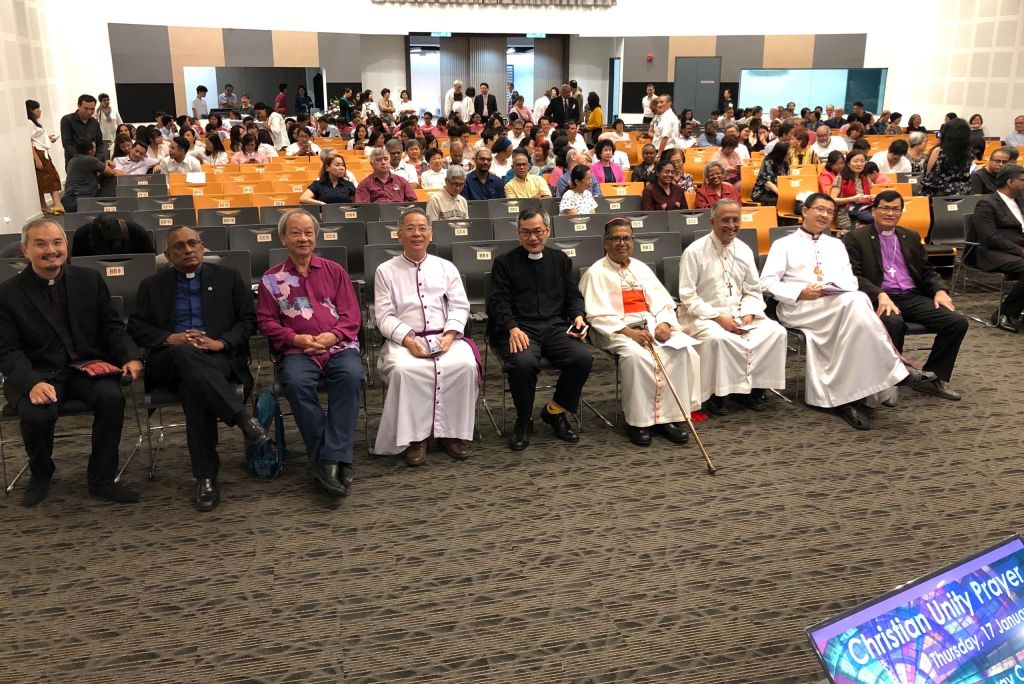
In 2018, the event was hosted by Wesley Methodist Church Kuala Lumpur, followed by Crossway Community Lutheran Church in Mont Kiara in 2019. St. Paul’s Anglican Church in Petaling Jaya hosted it in 2020, after which the COVID-19 pandemic forced the event to go online for two years.
In 2021, the Cathedral of St. John The Evangelist again hosted it albeit virtually, and it was followed by Gereja Presbyterian Malaysia in 2022. A return to in-person gatherings occurred in 2023, with the Wesley Methodist Church, Kuala Lumpur hosting the service. At the beginning of this year, the Evangelical Lutheran Church in Malaysia took its turn to host it.
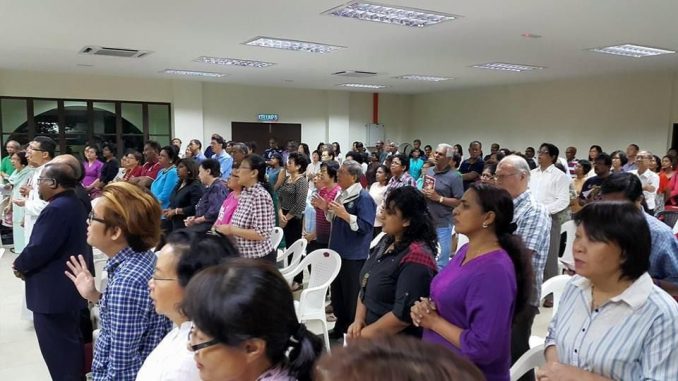
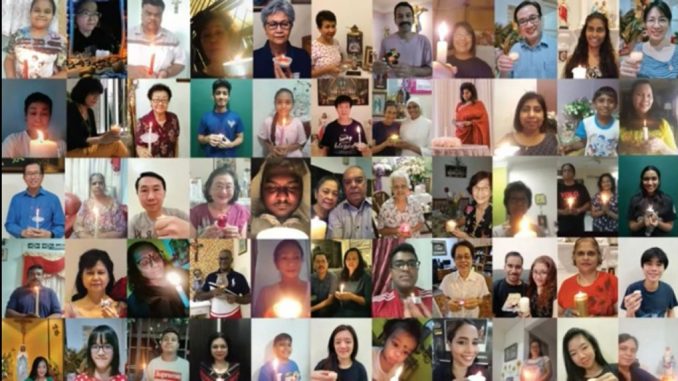
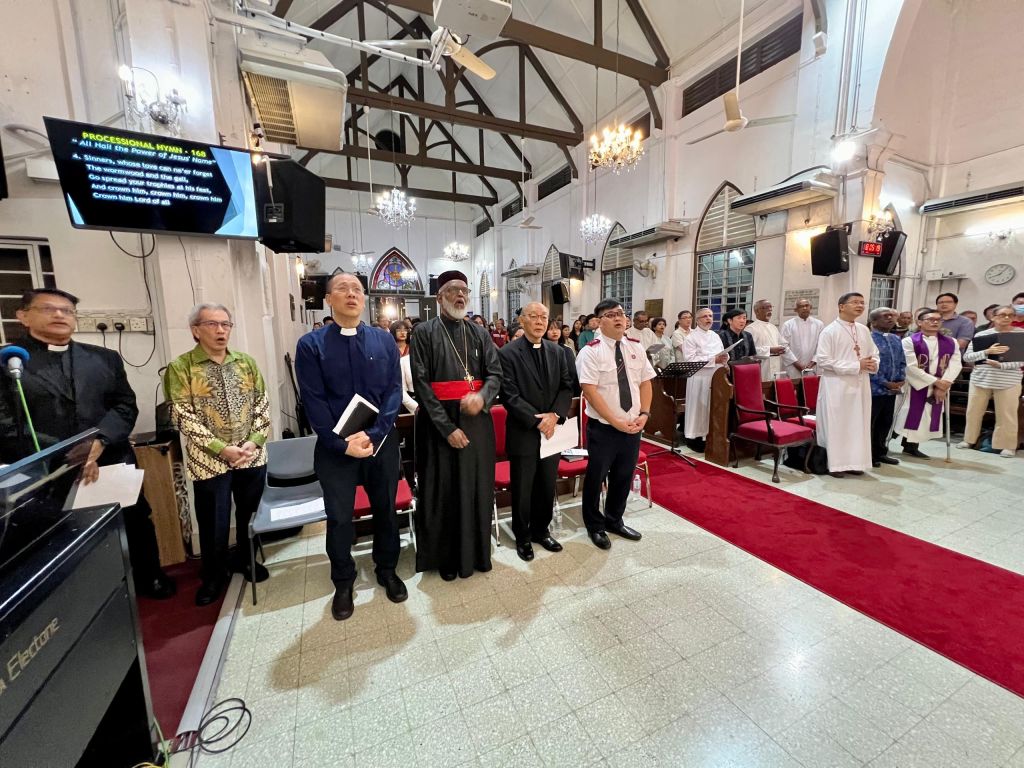
What can we look forward to in 2025?
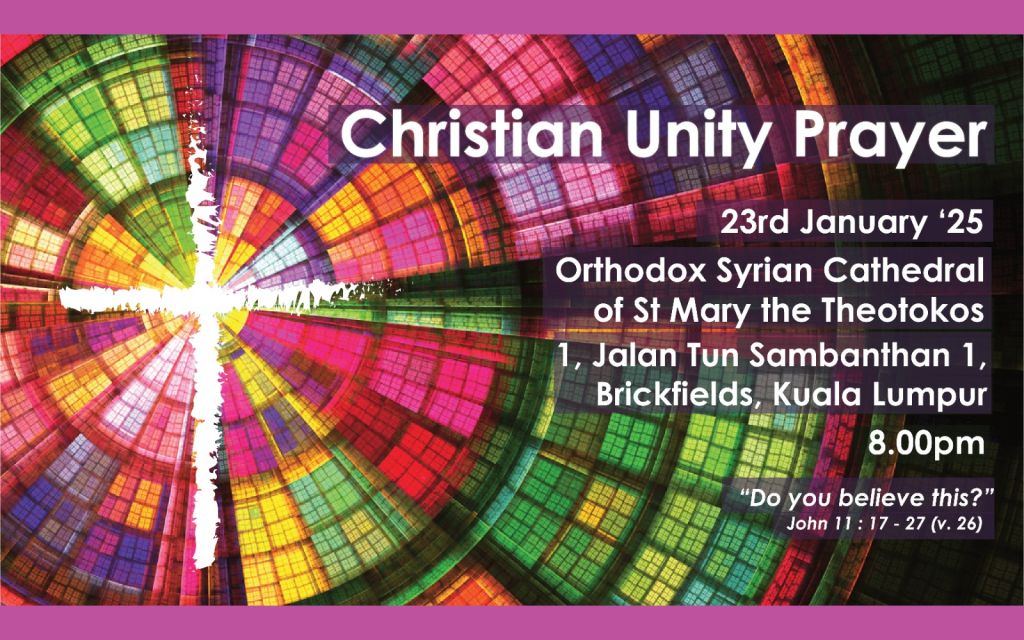
In 2025, the event will, for the first time, be hosted by the Syrian Orthodox Church in Malaysia. It will be at 8pm, Thursday evening, on the 23rd of January 2025. It will also mark the first full participation of the Christian Federation of Malaysia (CFM) – making it a historic double first. This is especially significant as The Very Reverend Philip Thomas Cor Episcopa, President of the Cathedral of St. Mary, the Theotokos (Syrian Orthodox Church), is also both the current Chairman of CFM and the President of CCM.
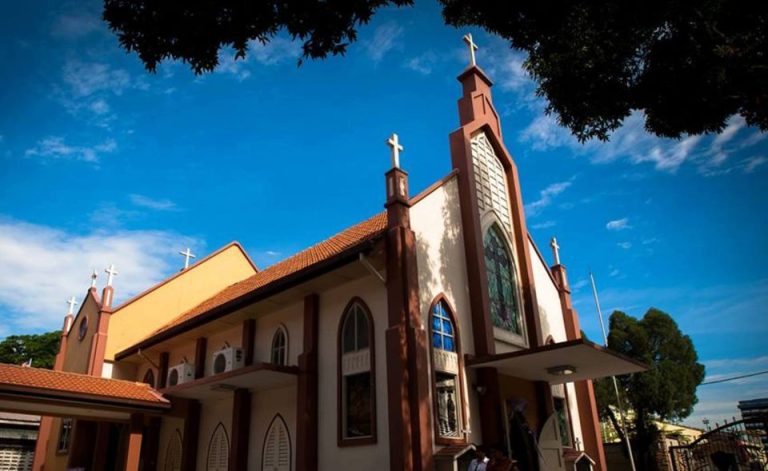
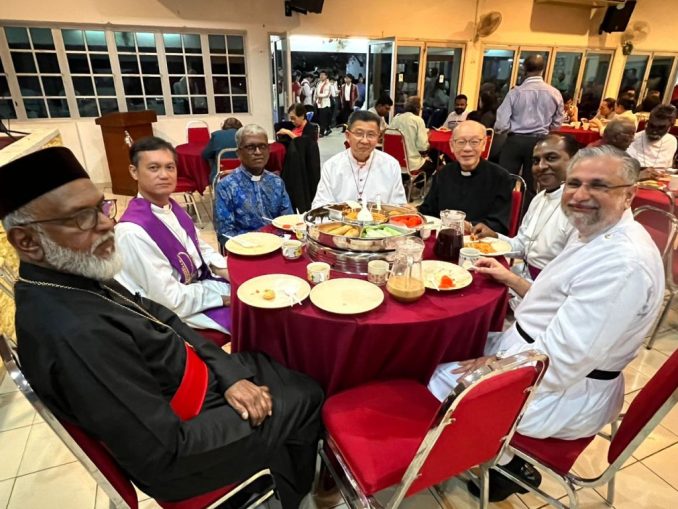
The Syrian Orthodox Church traces its apostolic origins to St. Thomas the Apostle, particularly in Antioch and India, where the church first flourished. Its Indian branch, the Malankara Syrian Orthodox Church, holds the tradition that St. Thomas brought Christianity to the Malabar Coast (modern day Kerala, India) around 52 CE. Using the Syriac language – a dialect of Aramaic spoken during Christ’s time – the Syrian Orthodox Church preserves the traditions and teachings of the apostolic era. St. Thomas is revered within the church, especially in its Indian tradition, as both a missionary and a martyr.
The Malaysia Day of Prayer
Besides the Week of Prayer, the Christian unity effort in Malaysia is also facilitated through the Malaysia Day of Prayer, held every year on 16th September which is celebrated as Malaysia Day by all Malaysians. We also chatted with Chrisanne Chin, Malaysia Day of Prayer (MDOP) Founding Member and Organising Committee about this significant prayer and unity event:
Could you walk us through the evolution of the Malaysia Day of Prayer since its inception in 2012, and how it has become a symbol of Christian unity in Malaysia?
The growth of the Malaysia Day of Prayer (MDOP) since 2012 has been truly remarkable and, frankly, unexpected. I’m deeply grateful to God for its evolution. The success of MDOP lies in the shared vision of churches and denominations across Malaysia, who eagerly embrace this opportunity for united worship. It has become a powerful, visible expression of Christian unity to the public.
MDOP has blossomed like a beautiful garden, encompassing various expressions of Christian faith – from Catholic to Evangelical traditions. Looking ahead, I hope to introduce more diverse initiatives that will extend beyond a single day event that bring churches together throughout the year, further strengthening our bonds of unity.
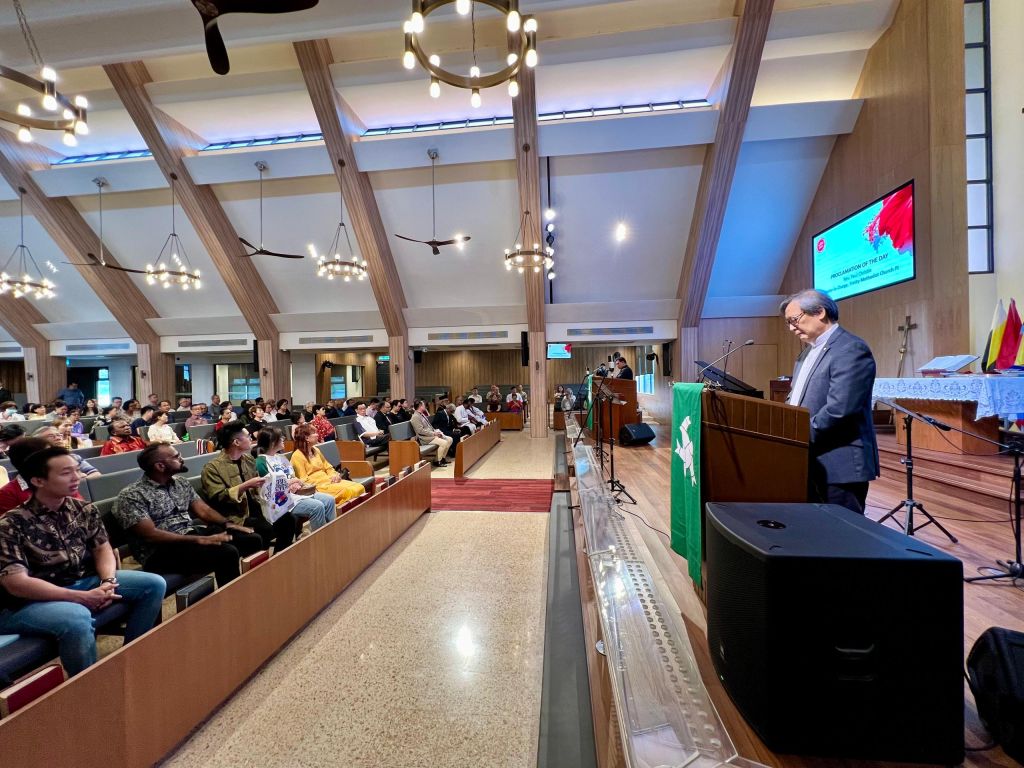
What were the key highlights and challenges faced during MDOP 2024, especially in returning to a full-scale onsite event post-COVID?
A significant highlight of MDOP 2024 was the enthusiasm of churches to serve as hosts. Their willingness to promote the event and invite Christians from their cities and communities was truly inspiring. Witnessing people make the effort to come together, even for just an hour or two, as a united voice in prayer, has been incredibly encouraging for our small technical team and me.
Our biggest challenge, however, was the instability of internet connections. This caused considerable stress, especially when attempting to showcase locations from Pitas in Sabah to Penang. Looking ahead to MDOP 2025, our goal is to feature Christians from Perlis to Sabah with reliable internet coverage, enabling live participation rather than relying on recordings. This expansion would beautifully represent the full breadth of Malaysia’s Christian community.
How has MDOP managed to incorporate the diverse languages, cultures, and denominations of the Christian community in Malaysia?
Incorporating Malaysia’s diverse Christian community has been an intentional and crucial aspect of MDOP. We deliberately create space for combined language groups and ensure extensive representation from Sabah and Sarawak in our programming. This commitment to inclusivity reflects Malaysia’s rich cultural tapestry.
To accommodate even more denominations and groups, we’re considering extending the event’s duration. This expansion would require enlarging our behind-the-scenes technical team. While it’s undoubtedly challenging work, we believe it’s essential for truly representing the diversity of Malaysian Christianity.
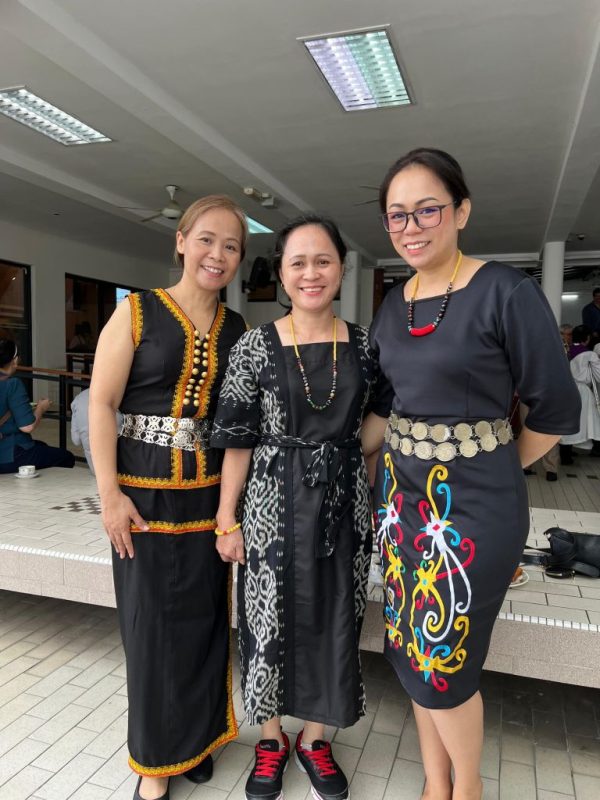
As a former CCM Youth moderator, how do you see the role of youth in shaping the future of nationwide prayer movements?
I’m a firm believer in youth leadership within prayer movements. In 2012, as part of CCM Youth, we took a bold step by organising a “Reset” prayer and worship gathering at Stadium Malawati in Shah Alam (which has just been demolished!). This gathering brought together youth and churches from across the country, which was quite ambitious considering the financial and logistical challenges involved. Then we received quite a lot of grief. On hindsight, it was truly a prophetic moment.
This initiative then evolved when 22 prayer networks, including NECF and CCM, came together united under Prayer United where I took the reins as their secretary until I retired last year. This experience reinforced my conviction that young people have the vision, energy, and capacity to lead transformative prayer movements. Their fresh perspectives and willingness to embrace new approaches are vital in shaping the future of nationwide spiritual initiatives. As we continue to encourage and empower youth leadership, I’m excited to see how they will innovate and expand the reach of prayer movements across Malaysia.
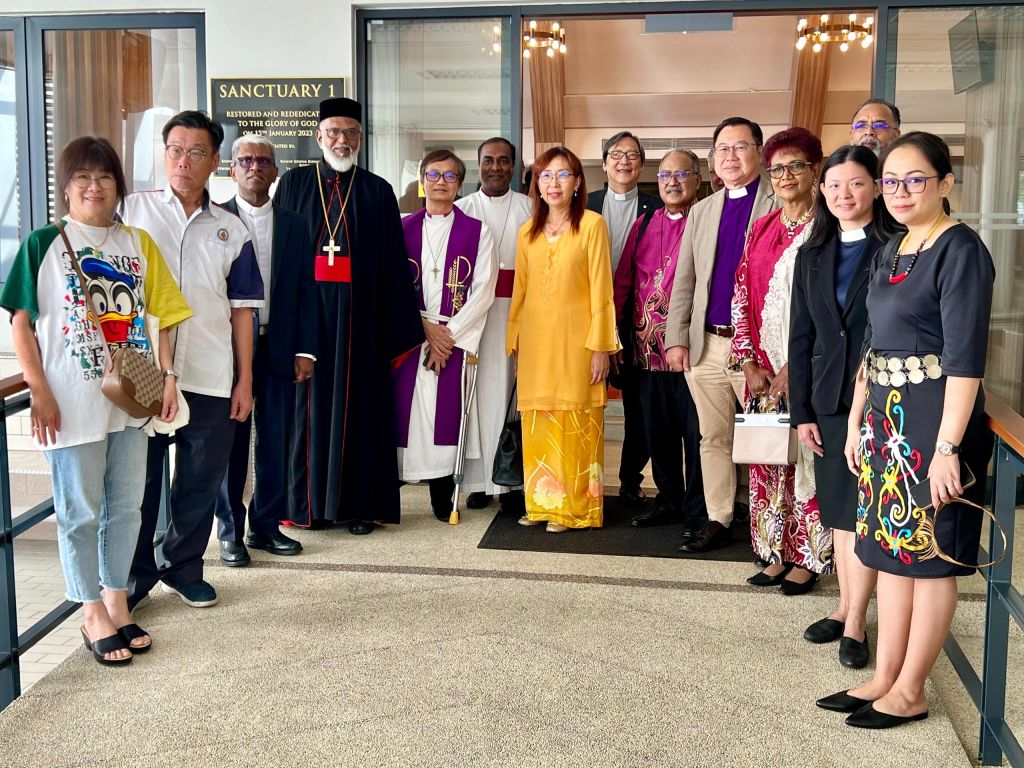
Fulfilling the Great Commission is not done by just one movement one church one denomination etc. It requires the cooperation of every church in the world. Pr Simon Eng from Hope KL shares on how to prepare our Plan of Action:
Christianity Malaysia would like to thank Elder Steven Fung, Chrisanne Chin, and the Council of Churches of Malaysia (CCM) for their hard work and help in the production of this article and for their support throughout the years. May this article be an encouragement and inspiration for all Christians to uphold the unity of the Church. All pictures except for those used for illustrations kindly contributed by Elder Steven Fung and CCM.
|Share The Good News|


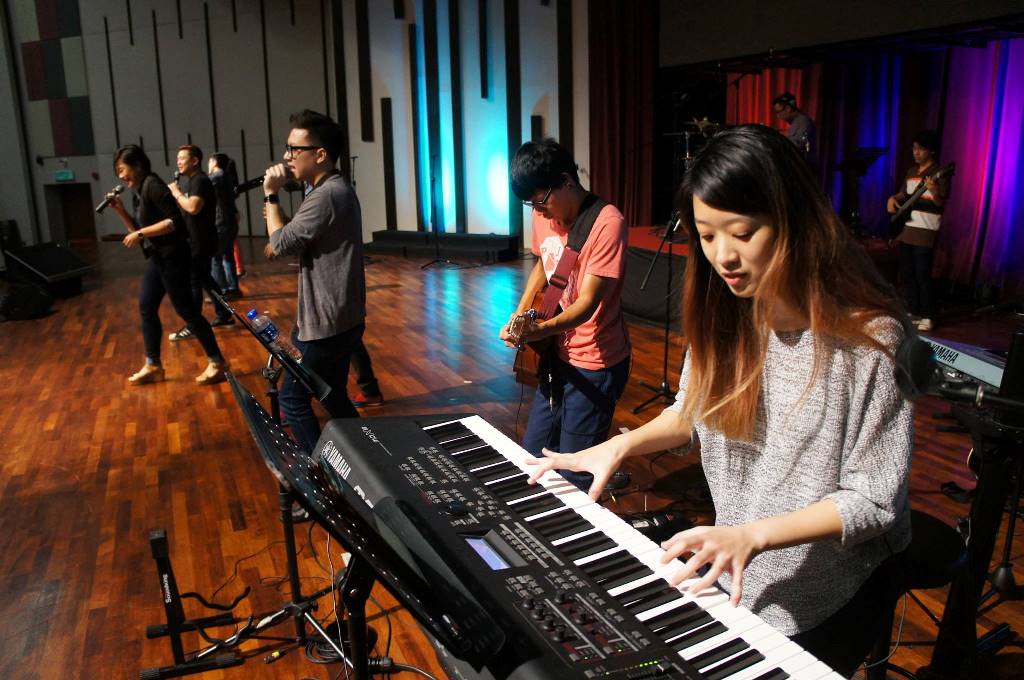

Leave a Reply